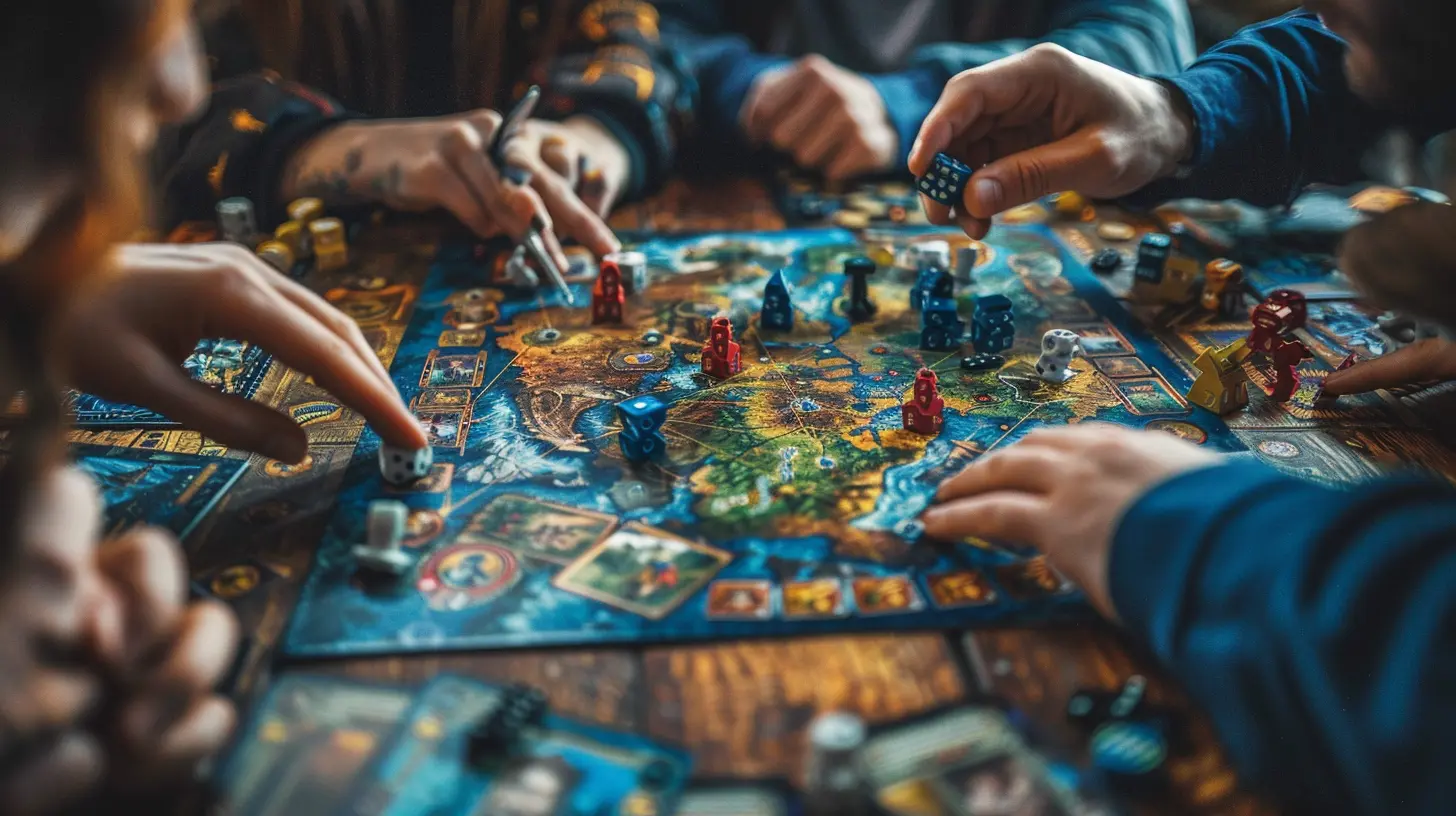Creative House Rules to Spice Up Your Favorite Board Games
13 July 2025
Let’s be real: while board games are a ton of fun, sometimes playing the same ones over and over can feel a little... predictable. You know exactly what’s coming next, and maybe that competitive edge you had in the beginning has dulled just a tad. But hey, you don’t need to shelve your favorite games just because they've gotten a little stale! Enter the magic of house rules.
If you’ve never dipped your toes into the house rules pool, oh boy, you’re missing out. House rules are like giving your classic games a fresh coat of paint or adding hot sauce to your favorite meal—just a little tweak can completely transform the experience. The best part? You get to play the game your way, creating laughs, surprises, and memories that are uniquely yours.
So grab your favorite board games off the shelf, gather your crew, and let’s dive into some creative house rules that’ll take game night to the next level. 
What Are House Rules, Anyway?
Before we dive into the good stuff, let’s clear the air: house rules are unofficial rules or tweaks you add to a game to make it more fun, balanced, or just plain ridiculous. They’re not in the game’s official instruction booklet, but they’ve been lovingly crafted (or chaotically made up) by players like you.Think of house rules like a remix of your favorite song. You’re not scrapping the original, just adding a funky twist to make it your own. And since there’s no "right" or "wrong" when it comes to house rules, your creativity is the only limit.
Why Add House Rules?
You might be wondering, "If the game works fine as is, why mess with it?" Fair question. But let me counter with this: why eat plain toast when you can add butter, jam, or even avocado? House rules enhance games by:1. Keeping Things Fresh – A little twist can prevent games from getting repetitive.
2. Leveling the Playing Field – Customize mechanics to make it fairer for players who are new or less experienced.
3. Encouraging More Interaction – Some house rules make games more social or chaotic (in the best way).
4. Adding Personalized Fun – It’s a chance to blend your inside jokes, favorite themes, or quirky ideas into the game.
Creative House Rules to Spice Up Popular Board Games
1. Monopoly: The Great Income Tax Break
Let’s face it, Monopoly has a reputation for being, well... endless. If you’ve ever spent six hours trying to bankrupt your cousin only to flip the board in frustration, this one’s for you.The Rule: Instead of paying your income tax to the bank, toss that cash into Free Parking. Whoever lands on Free Parking gets the haul! Suddenly, landing on that corner space goes from "meh" to "oh-my-god-please-let-it-be-me."
Why It Works: This injects some much-needed excitement into the game. Plus, it gives struggling players a chance to make a comeback instead of spiraling into financial doom. Monopoly isn’t real life, folks—let’s have some fun!
2. Catan: The Robber’s New Hobby
In Settlers of Catan, the robber is known for swooping in and ruining your day. But what if, instead of stealing your resources, the robber had a more... entrepreneurial spirit?The Rule: When the robber is activated, players can “bribe” it to leave them alone with a resource of their choice. The bribe gets added to a communal pool, and the next player to build a settlement or city adjacent to the robber's location gets to collect the stash.
Why It Works: This turns the robber into less of a villain and more of an opportunity. Plus, the bribe pool adds an extra layer of strategic gameplay—do you hoard resources or take a risk for the bonus?
3. Uno: Chaos Cards
Uno is already chaotic, but what if you cranked it up a notch? Introducing the Chaos Card rule.The Rule: Before the game starts, shuffle in three blank cards. When a player draws one, they can create any rule they want, and it stays in effect until the game ends. (Example: “Reverse cards now skip two players instead of just one.”)
Why It Works: This throws an unpredictable wrench into the game, keeping everyone on their toes. It also leads to hilarious arguments and temporary alliances as players navigate the madness. Just make sure everyone agrees on boundaries beforehand—no rules that end the game outright!
4. Clue: Secret Confessions
In Clue, figuring out the "who," "what," and "where" is all about process of elimination. But what if you could throw your opponents off the scent?The Rule: At any point in the game, players may make a “secret confession” and deliberately reveal one of the cards in their hand. However, they can also lie about it! Other players must decide whether to believe or doubt the confession.
Why It Works: Suddenly, Clue becomes less about deductive logic and more about reading poker faces. It adds a psychological twist to the game, making it way more engaging (and sneaky).
5. Scrabble: Word Mash-Ups
Tired of getting stuck with terrible letters in Scrabble? Let’s change the game with a rule that rewards creativity.The Rule: Players can combine two words (real or made-up) as long as they can use the new word in a convincing sentence. For instance, “Snackcident” (snack + accident) could be played with the sentence, “I had a snackcident and ate an entire pizza.”
Why It Works: It levels the playing field for players who may not have the world’s largest vocabulary. Plus, it’s hilarious trying to justify nonsensical words to the group. Prepare for laughs—and a bit of side-eye.
6. Pandemic: The Hero Boost
Pandemic is already challenging enough without the RNG gods working against you. So why not give your heroes a little extra power?The Rule: Each player chooses one bonus action they can use once per game (e.g., removing an extra cube, swapping hands with another player, teleporting to any city). These hero boosts add a cinematic flair to the gameplay while keeping the stakes high.
Why It Works: Sometimes losing three games in a row can sap the fun out of cooperative games. This rule gives players a fighting chance while still maintaining the tension that makes Pandemic so addictive.
7. Cards Against Humanity: The Roast Round
Cards Against Humanity is already outrageously fun, but if you want to make your friends squirm (in a good way), try this!The Rule: Once per game, the "Card Czar" can choose to initiate a Roast Round. In this round, all players must submit their most insulting (but still playful!) card combination targeting the Card Czar. The Czar chooses a winner based on which one makes them laugh—or cry—the most.
Why It Works: It flips the script and adds an interactive, personal element to the game. Just make sure everyone playing has a thick skin and knows it’s all in good fun.
8. Jenga: The Dare Tower
Want to turn a game of Jenga into something straight out of a party night? Add this spicy rule!The Rule: Write dares or challenges on some of the Jenga blocks (use sticky notes if you don’t want permanent changes). When someone pulls a dare block, they must complete the challenge. If they refuse, they take an extra turn.
Examples of Dares:
- Sing the chorus of your favorite song.
- Speak in an accent for the next two rounds.
- Take a selfie and post it with no context.
Why It Works: This takes Jenga from nerve-wracking to laugh-out-loud funny. Plus, watching your friend try to pull off a dare while keeping the tower steady is pure gold.
Tips for Creating Your Own House Rules
If none of the above sparks your imagination (or you just want to create something truly unique), here are a few quick tips to help you craft your own epic house rules:1. Start Small: Don’t overhaul the entire game on your first try. Add one or two tweaks and test them out before going wild.
2. Keep It Fun: The goal is to enhance the experience, not complicate the rules or slow things down.
3. Get Everyone’s Input: The best house rules are created collaboratively. Let your group brainstorm together.
4. Be Open to Change: If a rule isn’t working, tweak it or scrap it entirely.
Final Thoughts
Board games are meant to bring people together, and house rules are an incredible way to make your game nights even more memorable. Whether you’re turning Monopoly into a cash-grab free-for-all, or inventing silly words in Scrabble, the sky’s the limit when it comes to shaking up classic games. So next time you’re playing, throw in a new rule or two and watch your group’s faces light up with excitement. Who knows? You might just create a new tradition that sticks around forever!all images in this post were generated using AI tools
Category:
Board GamesAuthor:

Avril McDowney
Discussion
rate this article
2 comments
Aiden McTiernan
What a fantastic article! Adding creative house rules can breathe new life into our favorite games and foster unforgettable moments with friends and family. It's all about making the experience fun and engaging. Can't wait to try out some of these ideas at our next game night!
November 8, 2025 at 5:41 AM

Avril McDowney
Thank you so much! I'm glad you found the ideas inspiring. Have a fantastic game night!
Juniper Martinez
I love these ideas! House rules can truly transform game nights, making them more fun and memorable. Can’t wait to try them!
July 25, 2025 at 3:47 AM

Avril McDowney
Thank you! I’m glad you found the ideas inspiring. Have fun spicing up your game nights!


